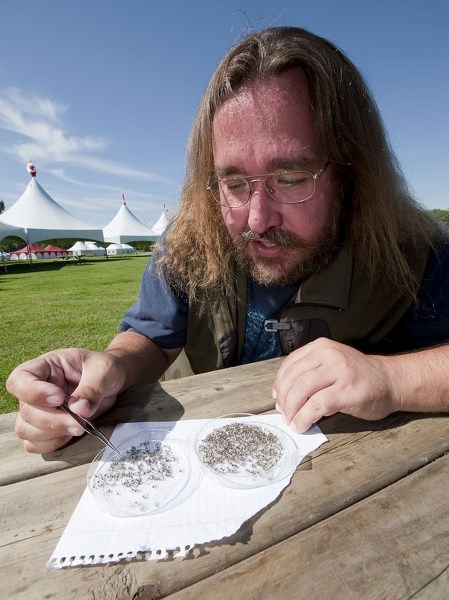Recent rains and humid air have brought a plague of mosquitoes upon the Edmonton region – one that city's official bug guy says could be the biggest one in decades.
City residents might have noticed a sudden jump in mosquito numbers in recent days. Seemingly absent for most of the summer, the little bloodsuckers returned in force this week, catching many people off-guard.
Golf pro Jordan Rodda said they didn't have any problems with the bugs this summer at the Sturgeon Valley Golf & Country Club prior to Tuesday. Come Wednesday, they were giving out their first-ever mosquito rain-cheques to golfers.
"The bugs were so bad people couldn't finish the round," he explained, speaking on Thursday.
"Yesterday was probably the worst day we've had (here) in my five years out here."
Sales of bug spray at the course have skyrocketed, with some 38 cans flying off the shelves in the last two weeks, he continued. Before that, they had sold just 11 all summer.
The bugs on the course are "unbelievable," he said. "You bat 10 away on your left arm only to have 10 more on your right arm."
Bug numbers way up
Mike Jenkins, biological science technician (bug guy) for the City of Edmonton, confirmed that mosquito populations have definitely increased around Edmonton in the last week or so.
"It's probably around the highest peak we've seen in August in probably decades," he continued, and definitely higher than the spike seen in 2012.
Crews were still crunching the numbers from the city's weekly traps (which are used to track trends and use light as bait), but Jenkins expects that most probably caught about 3,500 bugs in a week – equivalent to August 2001 levels, which were the highest in 20 years, and roughly enough to fill a coffee mug.
One daily trap (which is used for spot monitoring and uses CO2) in the North Saskatchewan River valley caught about 5,000 mosquitoes earlier this week, Jenkins noted – about five times what similar traps caught during the Edmonton Folk Festival earlier this month.
This year actually saw a slow start to mosquito season due to a cool, dry May and June, which let Edmonton crews treat more standing water for mosquitoes, Jenkins said.
But heavy rains in late July refilled many of those ponds and sloughs, prompting eggs to hatch. Mosquitoes lay their eggs on the edges of ponds so that they hatch when the ponds grow, Jenkins explained.
Jenkins said that it looked like other bugs blew into this region after the city did its treatments, as evidenced by the fact that the bugs seem most prevalent in regions like the river valley. High humidity has also made it easier for the bugs to fly and bite in hot, windy conditions.
Most of the bugs in the air right now are the ankle-biting Aedes vexans, Jenkins said.
"They get in there and zap you really quickly."
Jenkins said traps have also detected small numbers of Ochlerotatus dorsalis, which are active during the day. More commonly associated with springtime, Jenkins suspects these are bugs that didn't hatch back then because it was too dry. A tiny number of Culex tarsalis – known to carry the West Nile virus – have also been spotted.
Edmonton and St. Albert do not spray adult mosquitoes, so there's not much that can be done about this recent swarm now that it's hatched.
Jenkins suggests taking precautions to prevent bites such as wearing long pants and using bug spray with DEET in it.
"Most of the activity is going to be at dawn and dusk," he added, so avoid going outdoors at those times.
Rodda said he's seen all sorts of creative bug deterrents at the course, including dryer sheets in hats and belt-clip bug sprayers.
As for himself, he just lathers on the course's custom-ordered bug spray, which is 30 per cent DEET.
"It makes your skin crawl, but the bugs don't bother you," he said.
Mosquito activity usually winds down in August as shorter days prompt the bugs to switch from feeding to egg-laying and hibernation, Jenkins said. This current crop of bugs should probably die off in about 10 days.
But much will depend on the weather and humidity, he continued – if it dries out, the bugs will go away sooner.
"The mosquitoes are going to stick around a little bit longer," he said.




